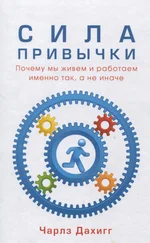C. Park, E. Iyer & D. Smith, “The Effects of Situational Factors on In-Store Grocery Shopping Behavior: The Role of Store Environment and Time Available for Shopping”, The Journal of Consumer Re-search 15, № 4 (1989): 422–33. Более подробную информацию по этой теме см.: J. Belyavsky Bayuk, B. Janiszewski & R. Leboeuf, “Letting Good Opportunities Pass Us By: Examining the Role of Mindset During Goal Pursuit”, Journal of Consumer Research 37, № 4 (2010): 570–83; Ab Litt & Zakary L. Tormala, “Fragile Enhancement of Attitudes and Intentions Following Difficult Decisions”, Journal of Consumer Research 37, № 4 (2010): 584–98.
D. Neal & W. Wood, “The Habitual Consumer”, Journal of Consumer Psychology 19, № 4 (2009): 579–92. Аналогичные исследования см.: R. Fazio & M. Zanna, “Direct Experience and Attitude – Behavior Consistency”, Advances in Experimental Social Psychology, ed. L. Berkowitz (New York: Academic Press, 2005); R. Abelson & R. Schank, “Knowledge and Memory: The Real Story”, Knowledge and Memory: The Real Story, ed. R. S. Wyer, Jr. (Hillsdale, N.J.: Lawrence Erlbaum, 2004); Nobert Schwarz, “Meta-Cognitive Experiences in Consumer Judgment and Decision Making”, Journal of Consumer Psychology 14, № 4 (09/2004): 332–48; R. Wyer & A. Xu, “The Role of Behavioral Mindsets in Goal-Directed Activity: Conceptual Underpinnings and Empirical Evidence”, Journal of Consumer Psychology 20, № 2 (2010): 107–25.
Julia Angwin & Steve Stecklow, “‘Scrapers’ Dig Deep for Data on Web”, The Wall Street Journal, 12/10/2010; Mark Maremont & Leslie Scism, “Insurers Test Data Profiles to Identify Risky Clients”, The Wall Street Journal, 19/11/2010; Paul Sonne & Steve Stecklow, “Shunned Profiling Technology on the Verge of Comeback”, The Wall Street Journal, 24/11/2010.
Слайд взят из доклада Поула на конференции «Мир предиктивной аналитики», состоявшейся 20 октября 2009 года в Нью-Йорке. К сожалению, он больше недоступен онлайн. Также см.: Andrew Pole, “Challenges of Incremental Sales Modeling in Direct Marketing”.
Проследить точные взаимосвязи между различными жизненными событиями и конкретными товарами довольно сложно. Хотя мы знаем, что люди, которые переезжают или разводятся, меняют свои покупательские привычки, мы не можем утверждать, что развод всегда влияет на покупку пива, а новый дом – на покупку хлопьев. Тем не менее общая тенденция сохраняется. Alan Andreasen, “Life Status Changes and Changes in Consumer Preferences and Satisfaction”, Journal of Consumer Research 11, № 3 (1984): 784–94. Более подробно см.: E. Lee, A. Mathur & G. Moschis, “A Longitudinal Study of the Effects of Life Status Changes on Changes in Consumer Preferences”, Journal of the Academy of Marketing Science 36, № 2 (2007): 234–46; L. Euehun, A. Mathur & G. Moschis, “Life Events and Brand Preferences Changes”, Journal of Consumer Behavior 3, № 2 (2003): 129–41.
Более подробно о том, каким образом некоторые события позволяют маркетологам (а также государственным агентствам, специалистам в сфере здравоохранения и др.) влиять на наши привычки, см.: Bas Verplanken & Wendy Wood, “Interventions to Break and Create Consumer Habits”, Journal of Public Policy and Marketing 25, № 1 (2006): 90–103; D. Albarracin, A. Earl & J. C. Gillette, “A Test of Major Assumptions About Behavior Change: A Comprehensive Look at the Effects of Passive and Active HIV-Prevention Interventions Since the Beginning of the Epidemic”, Psychological Bulletin 131, № 6 (2005): 856–97; T. Betsch, J. Brinkmann & K. Fiedler, “Behavioral Routines in Decision Making: The Effects of Novelty in Task Presentation and Time Pressure on Routine Maintenance and Deviation”, European Journal of Social Psychology 28, № 6 (1998): 861–78; L. Breslow, “Social Ecological Strategies for Promoting Healthy Lifestyles”, American Journal of Health Promotion 10, № 4 (1996), 253–57; H. Buddelmeyer & R. Wilkins, “The Effects of Smoking Ban Regulations on Individual Smoking Rates”, Melbourne Institute Working Paper Series № 1737, Melbourne Institute of Applied Economic and Social Research, University of Melbourne, 2005; P. Butterfield, “Thinking Upstream: Nurturing a Conceptual Understanding of the Societal Context of Health Behavior”, Advances in Nursing Science 12, № 2 (1990): 1–8; J. Derzon & M. Lipsey, “A Meta-Analysis of the Effectiveness of Mass Communication for Changing Substance-Use Knowledge, Attitudes, and Behavior”, Mass Media and Drug Prevention: Classic and Contemporary Theories and Research , ed. W. D. Crano & M. Burgoon (East Sussex, U.K.: Psychology, 2001); R. Fazio, J. Ledbetter, & T. Ledbetter, “On the Costs of Accessible Attitudes: Detecting That the Attitude Object Has Changed”, Journal of Personality and Social Psychology 78, № 2 (2000): 197–210; S. Fox et al., “Competitive Food Initiatives in Schools and Overweight in Children: A Review of the Evidence”, Wisconsin Medical Journal 104, № 8 (2005): 38–43; S. Fujii, T. Gärling & R. Kitamura, “Changes in Drivers’ Perceptions and Use of Public Transport During a Freeway Closure: Effects of Temporary Structural Change on Cooperation in a Real-Life Social Dilemma”, Environment and Behavior 33, № 6 (2001): 796–808; T. Heatherton & P. Nichols, “Personal Accounts of Successful Versus Failed Attempts at Life Change”, Personality and Social Psychology Bulletin 20, № 6 (1994): 664–75; J. Hill & H. R. Wyatt, “Obesity and the Environment: Where Do We Go from Here?” Science 299, № 5608 (2003): 853–55; P. Johnson, R. Kane & R. Town, “A Structured Review of the Effect of Economic Incentives on Consumers’ Preventive Behavior”, American Journal of Preventive Medicine 27, № 4 (2004): 327–52; J. Fulkerson, M. Kubrik & L. Lytle, “Fruits, Vegetables and Football: Findings from Focus Groups with Alternative High School Students Regarding Eating and Physical Activity”, Journal of Adolescent Health 36, № 6 (2005): 494–500; M. Abraham, S. Kalmenson & L. Lodish, “How T. V. Advertising Works: A Meta-Analysis of 389 Real World Split Cable T. V. Advertising Experiments”, Journal of Marketing Research 32, № 5 (1995): 125–39; J. McKinlay, “A Case for Re-Focusing Upstream: The Political Economy of Illness”, Applying Behavioral Science to Cardiovascular Risk , ed. A. J. Enelow & J. B. Henderson (New York: American Heart Association, 1975); N. Milio, “A Framework for Prevention: Changing Health-Damaging to Health-Generating Life Patterns”, American Journal of Public Health 66, № 5 (1976): 435–39; S. Orbell, “Intention-Behavior Relations: A Self-Regulatory Perspective”, Contemporary Perspectives on the Psychology of Attitudes , ed. G. Haddock & G. Maio (New York: Psychology Press, 2004); C. T. Orleans, “Promoting the Maintenance of Health Behavior Change: Recommendations for the Next Generation of Research and Practice”, Health Psychology 19, № 1 (2000): 76–83; C. G. DiClemente, J. C. Norcross & J. Prochaska, “In Search of How People Change: Applications to Addictive Behaviors”, American Psychologist 47, № 9 (1992): 1102–14; J. Quinn & W. Wood, “Inhibiting Habits and Temptations: Depends on Motivational Orientation”, 2006; T. Mainieri, S. Oskamp & P. Schultz, “Who Recycles and When? A Review of Personal and Structural Factors”, Journal of Environmental Psychology 15, № 2 (1995): 105–21; C. D. Jenkins, C. T. Orleans & T. W. Smith, “Prevention and Health Promotion: Decades of Progress, New Challenges and an Emerging Agenda”, Health Psychology 23, № 2 (2004): 126–31; H. C. Triandis, “Values, Attitudes, and Interpersonal Behavior”, Nebraska Symposium on Motivation 27 (1980): 195–259.
Читать дальше
Конец ознакомительного отрывка
Купить книгу












